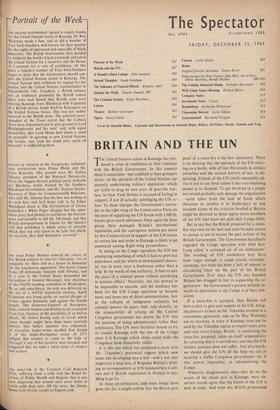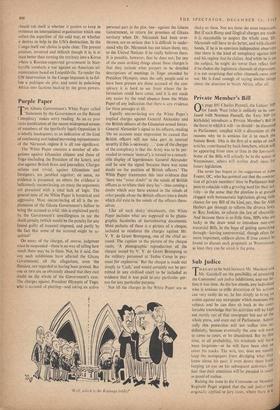BRITAIN AND THE UN
HE United Nations action in Katanga has pro- In taking on the Congo operation the UN was attempting something of which it had no previous experience, and for which its international charac- ter was in some ways a hindrance rather than a help. In the words of one authority, 'it had to take the place of a colonial power without interfering in internal affairs.' Naturally, this has proved to be impossible to execute, and the tendency has been for the UN Congo operation to become more and more one of direct administration. Just as the collapse of indigenous authority led colonial powers to assert their rule directly, so the impossibility of relying on the Central Congolese government has drawn the UN into the position of being administrators rather than arbitrators. The UN were therefore bound to try to reunite Katanga with the rest of the Congo since it is Katanga which alone could make the Congolese State financially viable.
It is this aim which has produced a clash with Mr. Tshombe's provincial regime which now looks like developing into a war—and a war that might last a long time, if Brigadier Rikhye's brief- ing to correspondents at UN headquarters is cor- rect and if British experience in Malaya is any- thing to go by.
In these circumstances, and since things have gone this far, it might well be that the British pro- posal of a cease-fire is the best alternative. There is no denying that the spectacle of the UN carry- ing on a battle, with all that this entails in civilian casualties and the normal horrors of war, is dis- quieting. Friends of the UN could reasonably ad- vise it not to use force unless it has overwhelming means at its disposal. To get involved in a jungle war would probably only damage the organisation —quite apart from the lack of funds which threatens to involve it in bankruptcy at any moment (some of the criticism levelled at Britain might be diverted to those eighty-seven members of the UN who have not paid their Congo bills).
But to say that the British proposal for a cease- fire may now be the best and most humane course to pursue is not to excuse the past actions of the British Government. The Government has clearly regarded the Congo operation with what Kai- Lung called 'a sustained air of no enthusiasm.' The wording of UN resolutions may have been vague enough to cause crucial misunder- standings, but there has been a lack of interest in elucidating • them on the part of the British Government. Ever since the UN was founded Britain has dragged its feet in supporting the or- ganisation : the Government's present attitude to- wards its operations in the Congo is at least con- sistent.
If a cease-fire is accepted, then Britain will have a duty to give real support to the UN, bring- ing pressure to bear on Mr. Tshombe to come to a reasonable agreement, and on Sir Roy Welensky not to interfere. A truce in Katanga must not be used by the Tshombe regime to import more arms and raise more troops; Britain, in sponsoring the cease-fire proposal, takes on itself responsibility for ensuring that it is carried out, and that the UN military position does not suffer. And afterwards, we should give the UN all the help we can in securing a viable Congolese government—or, if this proves impossible,. in administering the Congo.
Whatever disagreements there may be on the events of the recent past in Katanga, most ob- servers would agree that the future of the UN is now at stake. And what any British government should ask itself is whether it prefers to keep in existence an international organisation which can soften the asperities of the cold war, or whether it desires to help in the UN's destruction. In the Congo itself our choice is quite clear. The present position, involved and difficult though it is, is at least better than turning the territory into a Korea where a Russian-supported government in Stan- leyvillc conducts a war against an American ad- ministration based on Leopoldville. To render the UN intervention in the Congo impotent is to fol- low a politique III/ pire, and assist in polarising Africa into factions backed by the great powers.



































 Previous page
Previous page